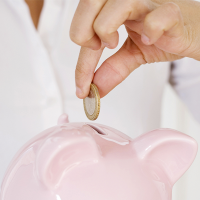12 Tips to Save Money with a Credit Card
Credit cards are a convenient way to purchase items, and are even necessary for some transactions, such as renting a car. But owning a credit card comes with some serious responsibilities.
You can be sure that a bank will not just give you money; they are lending you the money for a fee. These tips will help you avoid costly credit card issues.
1. Always carry around some cash
If you remember that you need to pick up a few groceries from a specialty store for your dinner, you may arrive to find that they don’t accept credit cards and have to find a nearby bank or ATM to get money.
If you use the cash back feature at your bank or pharmacy, you can carry around some cash to avoid this problem. But remember: don’t let cash burn a hole in your pocket. Only use cash when you have to.

2. Use debit instead of credit
Debit cards are a great way to avoid racking up credit card debt. You can deduct money directly from your checking account without worrying about having to pay it back later. But, be careful: if you overdraft your debit account, you could be looking at a hefty fee, perhaps even more than your credit limit. So stay on top of your finances to avoid these fees.
3. Read the fine print
Signing up for a credit card can seem like a daze of papers and legal documents. Fight the temptation to skip it and take the time to read exactly what you’re signing up for. If you don’t understand something, ask your bank’s representative to explain it to you. Don’t sign up for something you can’t do.
4. Read your card’s terms
If you read the terms of your credit card, you will know how best to use the card. For instance, if your card must be payed off by the 15th of each month, you can set a reminder to pay your credit off to avoid a fee. You may also be able to get your credit automatically drawn from your checking account each month, but be careful to make sure you have enough for that withdrawal every time.
5. Avoid cards with high rates
A credit card with a high limit will seem like a dream come true. On your card, you could charge your rent, your car payment, your insurance… But, what happens when you can’t pay for all of the things you’ve charged? You’ll get slammed with a hefty interest rate, and, not only will you have to pay back what you took, you’ll also have to pay a certain percentage of that back as interest to your bank. Try to find credit cards with low enough rates that if you do have to pay interest, you’ll be able to do so easily.
6. Watch out for fees
Your bank may have additional fees on your credit card that are associated with services they do for you. These fees can really add up. You may be able to avoid having to pay a fee once if you explain yourself to a customer service representative, but they will know if you keep coming back. So, try to find a card with as few fees as possible.
7. Late penalties add up
If you’re late paying back your credit card by a considerable time, you may have to pay additional fees for your lateness. In short, the bank wants its money back. Do what you can to avoid putting yourself in debt before the fees start to rack up further debt.
8. Stay away from variable APRs
A variable APR is a number issued by your bank that is adjusted according to the rise and fall of an index, like the U.S. Prime Rate. This means that the terms that you agreed to may change drastically or incrementally in a way that you don’t realize. So, you may expect to have the low annual percentage rate that you signed up with but discover that the rate had been bumped up over time. Avoid them entirely.
9. Don’t let a card expire from lack of use
Sometimes, if you don’t use an account for a long period of time, or if your balance is too low, you will be assessed a fee by your bank. This fee may be small, but can add up fast. Try to find a credit card that doesn’t have any fees for lack of use.
10. Do not cancel old cards
Credit scores are determined according to your credit history, so it may not be a good idea to cancel your card. If you’ve maintained good credit practices with your card, a cancellation might nullify these details from your credit report. If you’re trying to buy a new home or car, hold on to your old cards until you’ve made that purchase.
11. Don’t use over 30% of your limit
You may have a limit of thousands of dollars, but a good way to avoid getting into debt is to set a cap on how much you’ll take out. If you tell yourself not to use anywhere over 30% of your limit, you won’t accidentally let your credit situation get out of hand. Have a fixed idea of how far you can go with credit, before getting yourself into trouble.
12. Take advantage of reward incentives
Some banks offer incentives for use, such as points or payback amounts. If you use these programs shrewdly, you can actually make money off of your card instead of losing it. Talk to your bank’s representatives about incentive programs that they offer.
Credit cards can be a risky financial situation but they don’t have to be. Use these tips to develop a smart credit card lifestyle.





